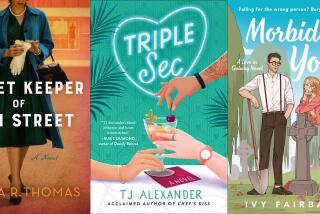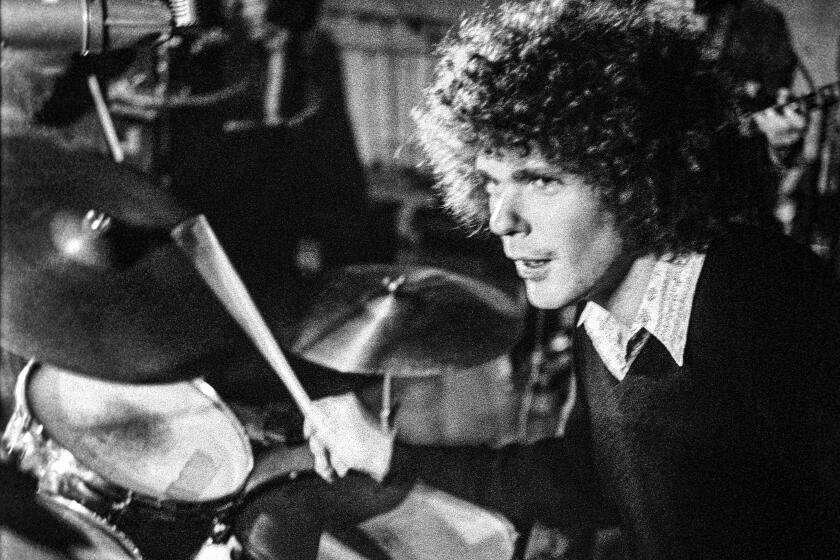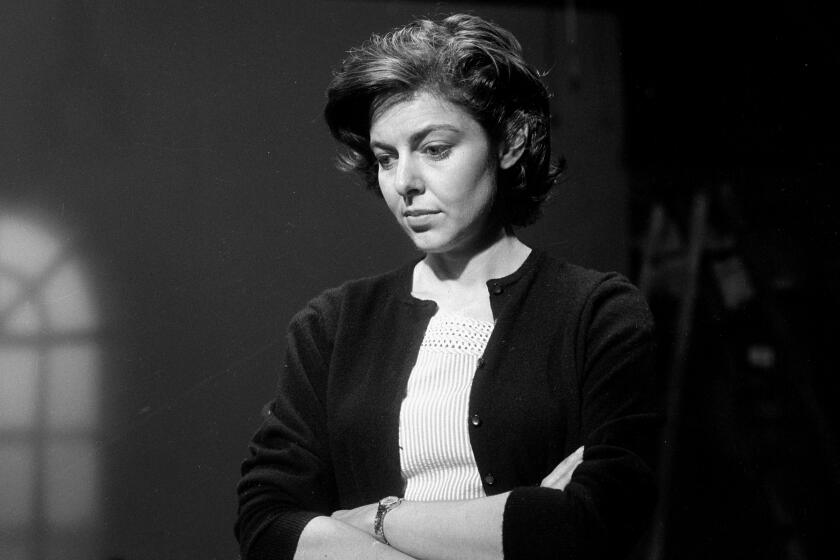Bigger Than Ever : Pat Conroy follows up “Prince of Tides” with an even grander tale : BEACH MUSIC, <i> By Pat Conroy</i> (<i> Doubleday: $27.50; 640 pp.</i> )
“I am large. I contain multitudes,” Walt Whitman wrote, and Pat Conroy, on behalf of his best-selling novels, could say the same thing.
In “Beach Music,” the author of “The Great Santini,” “The Lords of Discipline” and “The Prince of Tides” just gets larger. His narrator is a 6-foot-6 travel writer and gourmet cook, Jack McCall, who stuffs himself and everyone else in the novel with exotic and mouth-watering fare, calories be damned. His plot clings with one meaty fist to traditional Conroy concerns--the pain of dysfunctional families and the quicksand pull of that god-awful emotional swamp, the American South--and with the other tries to get a grip on the Vietnam War and the Holocaust.
Is this too much of a stretch? Not really. Largeness suits Conroy, just as minimalism has suited Raymond Carver and Ann Beattie. “Beach Music” is blockbuster writing at its best. A whole passel of people are going to stay awake late this summer compulsively turning its 640 pages before they close it in satisfaction.
Largeness needs some explaining. It isn’t just that “Beach Music” deals with suicide, schizophrenia, the high culture of Italy, the low culture of rural South Carolina, murder, baseball, child abuse, wife-beating, college high-jinks, the Marines, the anti-war movement, Hollywood, the Catholic Church, snake-handling cults, alcoholism, father-son stuff, father-daughter stuff, mother-son stuff, brother-brother stuff, classical music, Auschwitz and the life cycle of the loggerhead turtle--though it does.
And it isn’t just that Conroy, like most popular writers, relies on the 110% solution: making everything and everybody a little bigger than life. Jack McCall’s childhood friends are all beauties, athletes, artists, rebels or master politicians. His father, an ex-judge, may be a drunk but he’s also “a great legal mind.” His manipulative mother is “the sexiest woman I have ever known.” His four tumultuous brothers are masters of raunchy repartee. Jack can’t book a flight from Rome to Waterford, S.C., without getting shot by PLO terrorists; he and his buddies can’t go deep-sea fishing without hooking a manta ray roughly the size of Hilton Head.
No, Conroy’s main asset is his emotional range. He’s a warm and decent man who expresses love and nostalgia without embarrassment; he also can portray hate and meanness in convincing detail and make us understand, perhaps more than we want to, how mean and hateful people came to be that way. “Beach Music” doesn’t just describe the conflicts that tear families and friends apart; it aims to reconcile them.
Reconciliation is in short supply when the novel opens. Jack’s wife, Shyla, has committed suicide. After a bitter custody battle with her Jewish immigrant parents, he has moved to Rome with their daughter, Leah. He is completely and happily estranged from the South and plans to stay that way. Suddenly, though, Jack’s past intrudes on him from three directions at once:
His sister-in-law tells him that Shyla’s parents, George and Ruth Fox, have regretted their false testimony against him at the custody trial. They beg to see their granddaughter, now 8. And they drop a hint about a mysterious “lady of coins” that promises to explain some of the reasons for Shyla’s death.
Then two of Jack’s high school classmates contact him. Mike Hess, now a big-time film producer, and Capers Middleton, who is running for governor of South Carolina, plan to make a movie about their families’ history in Waterford, their friendship and how it foundered in the Vietnam era. They hope to recruit Capers’ ex-wife, Ledare Ansley, and Jack to write the screenplay. A key character would be Jordan Elliott, son of a hard-line Marine general, who accidentally killed two people in a protest bombing. Only Jack knows--though the others are beginning to suspect--that Jordan faked suicide 18 years ago and is living underground as a priest in Rome.
Mike has become the worst sort of Tinseltown slime. Capers turned state’s evidence against his anti-war comrades. Both want to recapture their innocence. The general wants to bring his son to justice. Jordan wants a father--even one who has been abusive and treacherous. Leah wants to meet her relatives. Ledare (though Shyla’s suicide has made her wary) wants Jack.
Jack wants none of it. But the third appeal breaks his resistance. It comes from one of his brothers, who announces that their mother, Lucy, is dying of leukemia.
So Jack moves with Leah back to Waterford, an old river port in South Carolina’s “low country,” where the process of healing takes place on the same three fronts.
The reconciliation between Jack and his family is the most convincing. Conroy knows these people inside out, and describes them with ease and humor and gusto. Lucy digs up a cache of family secrets, including what made her a liar, a seductress and a social climber--a childhood so harrowing and Dickensian that she was blind to her children’s garden-variety suffering.
Conroy has to strain, comparatively, to reconcile Jordan with the general and Capers with the friends he betrayed to further his political ambitions. The mechanism for doing this is blatantly artificial: a mock trial in Charleston’s Dock Street Theater with testimony from all concerned, a sobered-up Judge McCall presiding and Mike’s cameras recording every word. Still, haven’t we all fantasized that our lives could be summed up in such a way--without the terror of Judgment Day but with equal objectivity and authority? Like “Beach Music” as a whole, this section is a lot of things, but it isn’t dull.
As for the Holocaust, Conroy has the good sense not to try to find too much redemption there. He implies that the Vietnam War, in its destructive effect on an entire generation, was America’s Holocaust, but he doesn’t push the comparison, nor should he. The real Holocaust adamantly rejects feel-good endings. When George and Ruth Fox tell Jack their stories, he learns that exposure to so much evil permanently blighted their lives, that it blighted Shyla’s in spite of their efforts to give her a normal American upbringing and that her morbid identification with victims of the Holocaust led to mental illness and then to her death.
Southerners, Jews, concentration camps. Where have we seen this combination before? Of course: in William Styron’s “Sophie’s Choice.” And although Conroy’s style is only a distant cousin to Styron’s and Shyla, a secondary character, can’t attain Sophie’s tragic stature, “Beach Music” survives the comparison surprisingly well.
“Sophie’s Choice” is monumental, but it’s a monument full of cracks through which we glimpse jerry-built scaffolding. Conroy blends his autobiographical material into the fiction more smoothly than Styron did with the adventures of sex-starved young Stingo. The tone of “Beach Music” may wobble, but seldom do we feel--as we felt with Sophie and her demented boyfriend, Nathan--that the author is juggling time to hide contradictions in his characters that would become too apparent if we saw them act in chronological order.
Though Conroy tells us nothing new about the Holocaust, he has researched it thoroughly, and his telling is effective. As in the section about Lucy’s horrific childhood in Appalachia, his prose loses its emotional inflation and grows taut and dry-eyed and restrained. He writes about evil as well as the next person. Where he differs--where his largeness chiefly shows itself--is in his stubborn inclusion of at least a little good.
Shyla’s mother comes to America during World War II because an earlier Jewish immigrant, Max Rusoff, has heard about her plight by chance while trying to contact his doomed relatives in Eastern Europe. Ruth is a total stranger. Smuggling her out of Nazi-occupied Poland will cost $50,000. Rusoff doesn’t hesitate. He sells his thriving department store and grocery in Waterford to raise the money.
“The life of one girl doesn’t make much difference in a war this big,” the congressman who handles the negotiations chides Rusoff.
“I think it does,” he answers.
The little good can’t hope to cancel out the great evil, and Conroy knows it, but in “Beach Music” the two at least seem equally true.
Jack’s grandfather recalls that “when he watched the girl’s arrival” on the docks of Waterford, “it marked the first time he was certain that America would win the war. No matter how many times he told the story . . . it always gave the McCall children goose bumps when he got to the end.
“The town roared, he would say, the town just roared.”
An abridged version of “Beach Music,” read by Peter MacNicol, read by Peter MacNicol, is available on audiocassette from Bantam Doubleday Dell Audio (six cassettes: $27.50)
More to Read
More to Read
More to Read
Sign up for our Book Club newsletter
Get the latest news, events and more from the Los Angeles Times Book Club, and help us get L.A. reading and talking.
You may occasionally receive promotional content from the Los Angeles Times.






